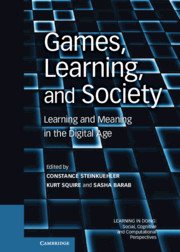Book contents
- Frontmatter
- Contents
- Contributors
- Series Foreword
- Foreword
- Acknowledgments
- Section I Games as Designed Experience
- Section II Games as Emergent Culture
- 10 Introduction to Section II
- 11 Nurturing Affinity Spaces and Game-Based Learning
- 12 Apprenticeship in Massively Multiplayer Online Games
- 13 Theorycrafting
- 14 Culture and Community in a Virtual World for Young Children
- 15 Culture versus Architecture
- 16 Participatory Media Spaces
- Section III Games as Twenty-First-Century Curriculum
- Index
- References
12 - Apprenticeship in Massively Multiplayer Online Games
Published online by Cambridge University Press: 05 August 2012
- Frontmatter
- Contents
- Contributors
- Series Foreword
- Foreword
- Acknowledgments
- Section I Games as Designed Experience
- Section II Games as Emergent Culture
- 10 Introduction to Section II
- 11 Nurturing Affinity Spaces and Game-Based Learning
- 12 Apprenticeship in Massively Multiplayer Online Games
- 13 Theorycrafting
- 14 Culture and Community in a Virtual World for Young Children
- 15 Culture versus Architecture
- 16 Participatory Media Spaces
- Section III Games as Twenty-First-Century Curriculum
- Index
- References
Summary
Imagine an entire 3D world online, complete with forests, cities, and seas. Now imagine it populated with others from across the globe who gather in virtual inns and taverns gossiping about the most popular guild or comparing notes on the best hunting spots. Imagine yourself in a heated battle for the local castle, live opponents from all over collaborating or competing with you. Imagine a place where you can be the brave hero, the kingdom rogue, or the village sage, developing a reputation for yourself that is known from Peoria to Peking. Now imagine that you could come home from school or work, drop your book bag on the ground, log in, and enter that world any day, anytime, anywhere. Welcome to the world of massively multiplayer online gaming.
Massively multiplayer online games (MMOs) are highly graphic 2D or 3D video games played online, allowing individuals, through their self-created digital characters, or avatars, to interact not only with the gaming software (the designed environment of the game and the computer-controlled characters within it) but also with other players’ avatars. These virtual worlds are persistent social and material worlds loosely structured by open-ended (fantasy) narratives where players are largely free to do as they please – slay ogres, siege castles, barter goods in town, or shake the fruit out of trees. They are notorious for their peculiar combination of designed “escapist fantasy” yet emergent “social realism” (Kolbert, 2001): In a setting of wizards and elves, princes and knights, people save for homes, create basket indices of the trading market, build relationships of status and solidarity, and worry about crime.
- Type
- Chapter
- Information
- Games, Learning, and SocietyLearning and Meaning in the Digital Age, pp. 154 - 184Publisher: Cambridge University PressPrint publication year: 2012
References
- 7
- Cited by

